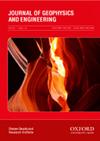Failure analysis of overlying strata in fault fracture zone during coal mining
IF 1.7
3区 地球科学
Q3 GEOCHEMISTRY & GEOPHYSICS
引用次数: 0
Abstract
Abstract Faults encountered during coal mining can compromise the continuity and integrity of the overburden, resulting in considerable differences in the stress, displacement, and failure fields of the rocks surrounding the fault zone. When a working face is located adjacent to a fault, the fault-disturbed overburden becomes activated and unstable along the fault plane, which could lead to mining disasters. The fault-adjacent overburden morphology during mining was analyzed using a physical model. A mechanical model of the stability of the fault-disturbed overburden was constructed. The criteria for determining the sliding failure of the overburden during mining were defined, from which the critical coal pillar width required to maintain the overburden stability was determined. The results indicate that an inverted trapezoidal block forms in the overburden due to the combined effects of mining and faulting. The morphology of this block is influenced by the coal pillar width, the height of the fractured zone, and the dip angles of fault and coal seam. The block is prone to sliding or rotational failure along the fault plane during mining. As the coal seam and fault dip angles increase, the critical coal pillar width for maintaining overburden stability decreases. Conversely, increasing coal seam thickness increases the critical coal pillar width. The critical width of coal pillar was determined to be 176 m, which was verified through field observations performed in the #3307 working face.煤矿开采断层破碎带上覆岩层破坏分析
煤矿开采过程中遇到的断层会破坏覆岩的连续性和完整性,导致断层周围岩石的应力、位移和破坏场存在较大差异。当工作面靠近断层时,断层扰动覆盖层沿断层面活化失稳,可能导致采矿灾害。利用物理模型对采动过程中断层邻近覆岩形态进行了分析。建立了断层扰动覆盖层稳定性的力学模型。定义了采动过程中覆岩滑动破坏的判定准则,据此确定了维持覆岩稳定所需的临界煤柱宽度。结果表明,采动与断裂共同作用,在覆岩中形成倒梯形块体。煤柱宽度、裂隙带高度、断层倾角、煤层倾角等因素均影响该块体的形态。开采过程中,块体容易沿断裂面发生滑动或旋转破坏。随着煤层倾角和断层倾角的增大,维持覆岩稳定的临界煤柱宽度减小。反之,煤层厚度越大,临界煤柱宽度越大。通过3307工作面现场观测,确定了煤柱临界宽度为176 m。
本文章由计算机程序翻译,如有差异,请以英文原文为准。
求助全文
约1分钟内获得全文
求助全文
来源期刊

Journal of Geophysics and Engineering
工程技术-地球化学与地球物理
CiteScore
2.50
自引率
21.40%
发文量
87
审稿时长
4 months
期刊介绍:
Journal of Geophysics and Engineering aims to promote research and developments in geophysics and related areas of engineering. It has a predominantly applied science and engineering focus, but solicits and accepts high-quality contributions in all earth-physics disciplines, including geodynamics, natural and controlled-source seismology, oil, gas and mineral exploration, petrophysics and reservoir geophysics. The journal covers those aspects of engineering that are closely related to geophysics, or on the targets and problems that geophysics addresses. Typically, this is engineering focused on the subsurface, particularly petroleum engineering, rock mechanics, geophysical software engineering, drilling technology, remote sensing, instrumentation and sensor design.
 求助内容:
求助内容: 应助结果提醒方式:
应助结果提醒方式:


